One August evening, a former girlfriend and I took an air mattress and a couple of sleeping bags to The Joshua Tree National Park in Southern California. I had missed our group’s party trip to see the Perseids Meteor Shower the previous Saturday night. From some of their reports, it sounded like everyone else in Southern California was there. I was sad to have missed our hiking group’s gathering but not so sad to have missed the crowds.
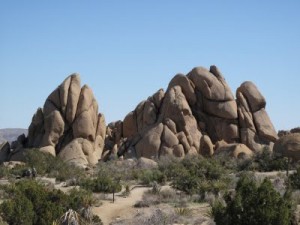
Jumbo Rocks Campground, Joshua Tree Nat’l Park
When we arrived at the Jumbo Rocks camp ground, we saw no more than five other vehicles at widely scattered points throughout the 124 camp sites. We selected a secluded site, paid our fees and unloaded a cooler, air mattress, two sleeping bags and two chairs. It felt as if we had the whole desert to ourselves.
We sat in the camp chairs and enjoyed a delicious chicken salad over fresh spinach and awaited the darkness. The sun had set before we arrived and a few stars began to appear. The temperature was, perhaps, a little warm, but there was a slight breeze that made it perfect. Quickly cleaning up our dinner plates, we settled onto our new queen-sized air mattress and watched the Heavens unfold before us.
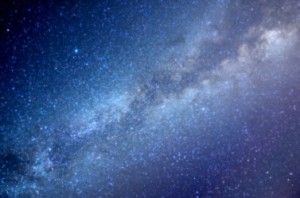 The sign at the fee station said that this night would produce the most meteors, but a website had said the previous two nights were to have been best. I really didn’t care which was most accurate. I was just happy to be there with her and to get a chance to sleep under the stars. The last time I had done so, ironically, was about 25 years ago at the same camp ground. It soon became evident that The Milky Way was right where I’d left it.
The sign at the fee station said that this night would produce the most meteors, but a website had said the previous two nights were to have been best. I really didn’t care which was most accurate. I was just happy to be there with her and to get a chance to sleep under the stars. The last time I had done so, ironically, was about 25 years ago at the same camp ground. It soon became evident that The Milky Way was right where I’d left it.
The Moon was a waning crescent so it wouldn’t rise until a few hours before sunrise. Basically, we had a perfect night for star gazing with only a few wisps of clouds. Still, even on this moonless night, there was enough ambient light from as far away as the Coachella Valley to the South that I had no trouble seeing the surrounding area or walking across the camp site in the “dark.”
 As usual for me, I didn’t relax until I had checked my surroundings, making sure I was oriented and knew the most direct route to the car and which objects were on the ground to affect my footing should an aggressive intruder surprise me and elicit a confrontation. She, of course, sensed this and reminded me that I was on a mattress in a nearly deserted camp ground in the middle of the high desert and not in a police car from decades past. Unbeknownst to most, I usually have some sort of defensive weapon with me or within reach when I am out of my every day environs. On this occasion I only had my Swiss Army Officer’s Escape and Evasion Knife so if some hoodlum did decide to confront me, I could have wrestled him to the ground, filed his nails, trimmed the frayed cuffs on his jeans and tightened the screws on his glasses.
As usual for me, I didn’t relax until I had checked my surroundings, making sure I was oriented and knew the most direct route to the car and which objects were on the ground to affect my footing should an aggressive intruder surprise me and elicit a confrontation. She, of course, sensed this and reminded me that I was on a mattress in a nearly deserted camp ground in the middle of the high desert and not in a police car from decades past. Unbeknownst to most, I usually have some sort of defensive weapon with me or within reach when I am out of my every day environs. On this occasion I only had my Swiss Army Officer’s Escape and Evasion Knife so if some hoodlum did decide to confront me, I could have wrestled him to the ground, filed his nails, trimmed the frayed cuffs on his jeans and tightened the screws on his glasses.
But I was prepared for that possibility!
I eventually allowed myself to relax and open myself up to the sky before me. In our over-polluted world, the stars are no longer the traveling companions and navigational beacons which served mankind for millennium. Most days now they are nameless specks of which we see only a few on a really clear night. We’re lucky if we can see a hundred stars and I couldn’t remember the last time, in my harried life, that I had taken the time to look at stars.
But this night I was rapidly immersed in a sense of the wonder with which ancient humans must have viewed the night sky. To say it is immense is an understatement. Obviously The Universe is immense. I mean that even from our vantage point on this tiny planet, with our limited visual capabilities, it is colossal to consider.
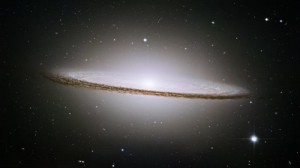
Sombrero Galaxy
As the sky grew darker, the center of our galaxy became more visible. Our solar system sits about two-thirds of the way out on an outer arm of a spiral galaxy we’ve named The Milky Way. Within our galaxy are an estimated 200 billion to 400 billion stars. The Milky Way’s soft band of light was first proven to be stars by Galileo in 1610. In the 1920’s, astronomer, Sir Edwin Hubble, with his telescope, discovered more galaxies. And in the past two decades, the space telescope named for Hubble has discovered that many of the small blotches of light at the outer limits of our earth-bound telescopes were actually more galaxies. With these discoveries, astronomers are now estimating that there are 125 billion galaxies, each containing 100 billion to 500 billion stars. In the Milky Way, estimates are that there are at least 100 billion planets around these stars, with approximately 10 billion of them in the “habitable zone” of the stars. You do the math as to how many habitable planets there are in our known Universe.
As I contemplated these numbers, I thought about our small, blue spec that floats in this vastness. All we know of our history—all the wars and the conquests and the tyranny and the injustices, all of the sorrow and selfishness and disappointments, all the joy and happiness, all the love and compassion, all of the triumphs and achievements, all of our loved ones and loved ones lost—all of it took place on this tiny, insignificant spec. I looked up and out at this vastness (remembering that all of the stars we can see with the naked eye are within our own galaxy) and wondered what other struggles and joys were occurring at that very moment.
If we say that only one ten-millionth of the 10 billion stars in our own galaxy’s habitable zone have intelligent life, then that means there are still 100 other planets in our galaxy with intelligent beings. Are they encountering the same daily struggles as I? If we use the same calculations on the rest of the known galaxies (that only one ten-millionth of the planets in those stars’ habitable zones have intelligent life) that gives us approximately 125 trillion planets with intelligent life.
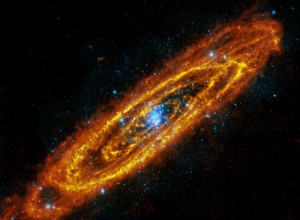
Andromeda Galaxy, our nearest neighboring galaxy.
What are these beings doing? Have they gotten a grip on their lives? Do they experience life as do we? Are there joys and sorrows in their existences? Do they live in peace? Do they declare war(s)? Do they hate? Do they Love?
Do they marvel at a sunrise? A moon(s) rise? Do they automatically join a baby in laughter? Does it rain where they come from so they can smile at a light sprinkle on their face? Do they enjoy each others’ company? Do they socialize? Do they share meals? Do they write to their mother? Do they take a moment to look at one another and say, “I love you?” Do they hate one another because of differing viewpoints? Are “others” segregated as “different?” Do they have religion and kill one another in the name of a deity? Or do they Love one another in the name of a God? Do they take a moment, even once in one of their days, to marvel at the miracle of their very existence?
Do I?
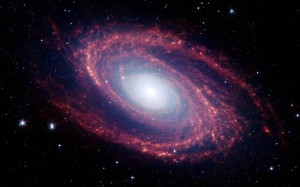
Spiral Galaxy – M81
These thoughts and others turned over in my tiny brain. We talked throughout the evening but also watched the skies in silence, simply enjoying each other’s company and the majesty before us. Our first meteor flashed across the sky at 9:25 p.m. I saw a total of only eight that evening but I was not disappointed. I went, first to be with her, but also to see some falling stars. Yet before my eyes that night was all of Creation. All of it. I couldn’t see it all, but it was there. Everything that is was laid out in front of me.
And I am part of everything that is.
If I am a part of this Universe, if I am made of the same star dust that spiraled out for countless light years in every direction, am I looking back at myself? Was I created so that I could look up and marvel at the rest of the star dust that is The Universe? And if I am a part of this, was I created by The Universe so I could look up and marvel at myself?
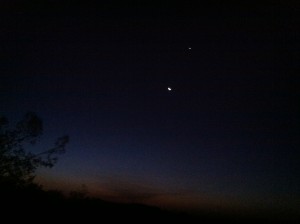
Moon and Venus (Jupiter just out of frame)
I had more and more thoughts like this until, somewhere amidst these swirling galaxies of stars and star dust, I fell asleep. I awoke at about 4:00 a.m. to be greeted by a waning crescent Moon along with Venus and Jupiter. The sun was only another few hours or so behind. As the stars faded and the morning light grew brighter, I felt myself returning to the more mundane thoughts that dealt with what I had planned for the day and those ahead. But I couldn’t shake the magnificence of what lay before me that night and I have carried it with me in the days since. I already yearn to return to the high desert to experience it again. I’m wondering, however, if my pondering brain can take it. Why can’t I just look up and say, “Oooh, look at the pretty stars!”
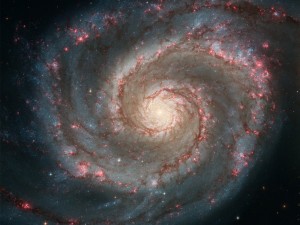
Whirlpool Galaxy
Dr. Carl Sagan said in his forward to Dr. Stephen Hawking’s A Brief History of Time, (I am paraphrasing) “We know the Universe is everything. We know The Universe is expanding. If The Universe is everything and it is expanding, into what is it expanding?” He went on to say that, as human beings, we are not capable of understanding The Universe.
I don’t know why I don’t listen to that statement and stop asking myself these kinds of questions. They are obviously beyond my ability to comprehend, but I find my way back to them at various times. Or they find their way back to me. One way or another.
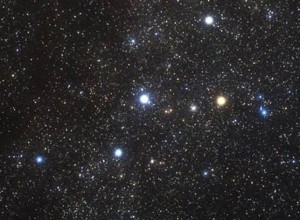
Cassiopeia
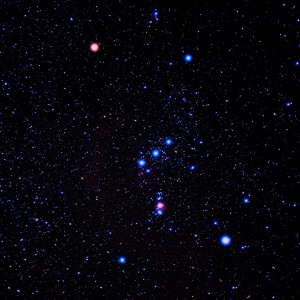
Orion
I am often frustrated that I puzzle over thoughts for which I will never have as answer. But, even with brow wrinkled over thoughts of creation and its immensity, and my part therein, I smiled as I recalled seeing the constellations Cassiopeia, Orion, Ursa Major and the stars Polaris and Vega. And greeting me before the sunrise were the planets Jupiter and Venus. It was as if I was visited by several old friends that night, old friends from my middle school astronomy days. These were some of the first celestial bodies I learned to identify in the skies on a summer night. With all of my pointless pondering, my old companions were still there and the simple times they evoked, comforted me and left me, again, filled with wonder.




Another way of looking at it is this:You are a signle person on a planet of nearly 7 billion, in a solar system of 9 planets, in a galaxy of billions of solar systems, in a universe of billions of galaxies. Feel insignificant now? But, out of billions of galaxies, with billions of solar systems, on a planet with 7 billion people, YOU are unique.
Thank you, Milena. I agree!